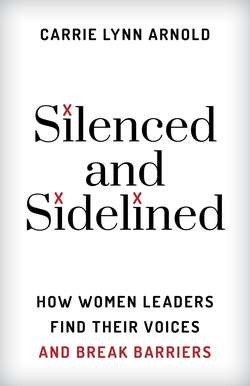Читать книгу Silenced and Sidelined - D Lynn D Arnold - Страница 11
На сайте Литреса книга снята с продажи.
Who Is She?
ОглавлениеI began to learn that I needed to go into every situation with armor on—assuming that I would be attacked. I had to be ready to defend myself rather than being collaborative and open and, you know, furthering the company. It really was armoring every day.
—Marketing Executive
I ring the doorbell and stand on a well-manicured porch. I hear the sounds of workers inside the home mingled with a dog barking. She answers the door dressed in a sweatshirt, jeans, and comfortable shoes. The women in my research have agreed to meet me in many different places—homes, corner offices, restaurants, coffee shops, and virtual workspaces. I have driven to other states to hear their stories, and I have transcribed hundreds of hours of interviews. From California to the Philippines—the silenced female leader has raised her hand upon hearing about my research. As a writer and social scientist, I have many problems. Finding women to talk to me about their experience with silencing is not one of them. Hands raised so quickly; I struggled to respond to every interested participant. When I replied and asked for an interview, I often heard positive exclamations—a sense they were chosen. They were going to be heard.
Kris is a marketing executive with two master’s degrees and a background that includes start-ups and experience working for a major American multinational information technology company headquartered in California. As I set up for the interview, we meet in her study and are joined by her lap dog. Her furry canine looks at me with those dewy dog eyes that make most people feel gooey inside. There have been several dogs glued to their human moms during interviews. They sensed the conversation was essential and believed they were needed. It was indeed true this particular afternoon.
As was my custom, I launched into a logistical explanation of my research and began with a background question after clicking the button on my recording device. This particular leader entered into the conversation with a genuine readiness. It was almost like she was desperate for me to ask her the right question as no one else had yet. She had a story to share, and my first two questions turned her faucet to a steady pour. Her eyes teared up before she could get her entire background stated for the record. Like many other women I meet and interview, the emotion from silencing cannot always be contained. When someone tugs on the right string, the body responds in multiple ways.
There are lots of ways we silence each other. I can interrupt someone mid-sentence or gesture in a way that cuts someone off. I can talk over, occasionally make another person’s idea one of my own, or be sarcastic in a way that shuts someone up. In our excitement, carelessness, anger, or state of being fallible human beings—we silence each other. Most of the time, we shake it off, laugh at it, roll our eyes, get over it, and move on. Such is life, and we learn early, not everyone is a good listener, and not everyone is interested in our thoughts and opinions. These small occurrences or one-offs do not change the way we are in the world. They do not cause our existence to shift as I spoke about in chapter 1. I can still be my genuine self with my authentic voice after someone accidentally, or even intentionally, silences me.
The silencing that causes a change in how we are in the world, that causes us to show up as silenced, versus just a little ticked, is what I call viral silencing. When we experience an egregious event or patterns of micro-aggressive behavior over prolonged periods, it gets deep into our system and can permeate or spread. Micro-aggression can come in the form of a statement, action, or incident that may be regarded as indirect, subtle, or unintentional. Comments can be benign on the surface but be discriminatory and painful deep inside. This pervasive penetration if not mitigated, shifts our thinking, feelings, spirit, health, and leadership. We feel silenced, act silenced, and our systems and domains are compromised.
In our earnestness to understand things in life, people will often oversimplify. When I have presented the topic of female leadership silencing at conferences, attendees sometimes ask questions like, “Is this about a lack of confidence?” Or, “What’s the difference between feeling silenced and feeling bullied?” And my favorite (. . . not really), “Are these women behaving like victims?” The answer to that last question is a resounding NO!
The other questions of what this may be similar to or different from gets back to understanding distinctions. Sometimes things can look very much alike but be different. Yes, of course, there are elements of confidence at play, but this is not just about building confidence. Sometimes it can be about bullying—but not always. So, before I say more about what it means to be a silenced leader, let me explain what it is not.
